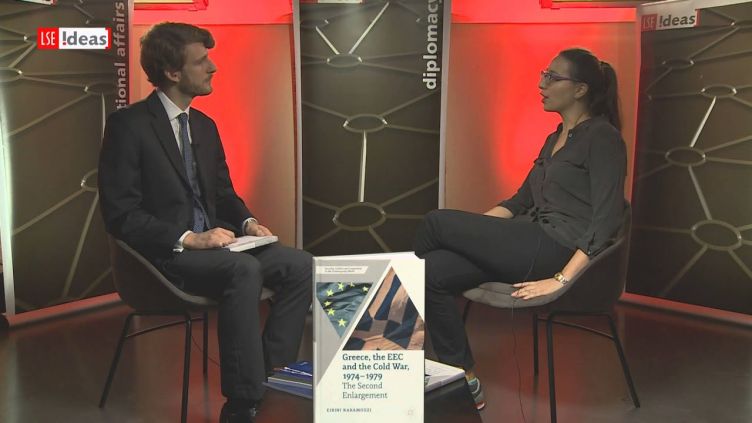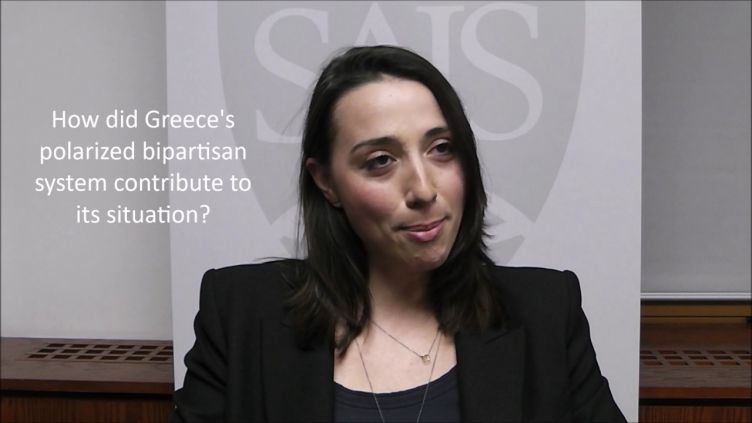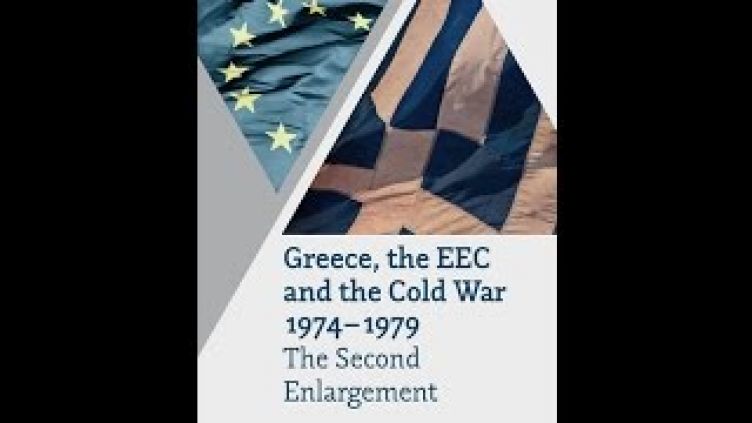Dr Eirini Karamouzi
MSc, PhD, (London School of Economics)
Department of History
Senior Lecturer in Contemporary History
Full contact details
Department of History
Jessop West
1 Upper Hanover Street
Sheffield
S3 7RA
- Profile
-
I joined the History department at the University of Sheffield in September 2014. I hold an MSc in European Politics and Governance and a PhD in International History, both from LSE.
I have also held a A.G. Leventis Fellowship at SEESOX, St Anthony's College, Oxford (2014-15), a Max Weber Fellowship at the European University Institute in Florence (2013-14) and a Pinto Postdoctoral fellowship at LSE IDEAS (2011-12).
Before moving to Sheffield, I was a Lecturer of European Studies and History at Yale University.
My first book Greece, the EEC and the Cold War, 1974-1979: The Second Enlargement reveals the rationale behind Europe's decision to accept Greece in its circle and details the dynamics of the accession negotiations in the evolving environment of detente and the rise of the Left in Southern Europe.
I am an expert in the history of European integration, Cold War, political and social history of Modern Greece, Balkans and peace movements.
I have written on issues of Balkan cooperation, EU identity and democratisation, as well as Greece’s foreign policy, civil society, anti-americanism and the development of detente.
I am currently (2019-2021) a Visiting Professor of History at the University of Tampere, Finland acting as co-I for a project at the Academy of Finland (480,000 euros) on ‘Foreign Policy in Alliance or in Non-Alignment?
History of the Post-War World Order Through the Eyes of European Non-Hegemonic Powers’.
I am also a Visiting Fellow at LSE IDEAS, co-directing a project on Peace and Security that looks at global grassroots activism for peace during the Cold War.
I was Principal Investigator of the two-year project (2016-2018), 'Protest as democratic practice: peace movements in southern Europe, 1975-1990' (Max Batley Fellowship Awards scheme) with Prof Ziemann and Prof Grasso (Politics). Dr Giulia Quaggio was the Postdoctoral fellow of the project.
I was a member of the EU-funded consortium on the Official History of the European Commission, 1986-2000(HISTCOM3) and the online resources and book (open access) were published in 2019.
The volume is based largely on hitherto unpublished sources and draws upon the personal testimony of numerous former Commissioners and officials.
- Research interests
-
I joined the History department at the University of Sheffield in September 2014. I hold an MSc in European Politics and Governance and a PhD in International History, both from LSE. I have also held a A.G. Leventis Fellowship at SEESOX, St Anthony's College, Oxford (2014-15), a Max Weber Fellowship at the European University Institute in Florence (2013-14) and a Pinto Postdoctoral fellowship at LSE IDEAS (2011-12).
Before moving to Sheffield, I was a Lecturer of European Studies and History at Yale University, and from 2019 to 2021 I was a Visiting Professor of History at the University of Tampere, Finland acting as co-I for a project at the Academy of Finland (480,000 euros) on ‘Foreign Policy in Alliance or in Non-Alignment?
My first book Greece, the EEC and the Cold War, 1974-1979: The Second Enlargement reveals the rationale behind Europe's decision to accept Greece in its circle and details the dynamics of the accession negotiations in the evolving environment of detente and the rise of the Left in Southern Europe. In 2021, the Bank of Greece commissioned me to write a book on the role of Ioannis Pesmazoglou in Greece’s Association to the EEC, that will appear in 2023. I was also a member of the EU-funded consortium on the Official History of the European Commission, 1986-2000 (HISTCOM3) and the online resources and book (open access) were published in 2019.
I have written peer-reviewed articles on issues of Balkan cooperation, EU identity and democratisation, as well as Greece’s foreign policy, peace movements and civil society, the role of anti-americanism in Southern Europe.
I am currently (2022-2024) a co-I with Luc Brunet (Open University) of an AHRC networking grant on Global Histories of Peace and anti-Nuclear activism (£ 45,000). The Global Peace Research Network (GPRN) will provide a global perspective of the study of anti-nuclear and peace activism since 1945. While most existing scholarship on opposition to nuclear weapons remains focused on Western Europe and North America, the GPRN will work with nine universities and NGOs across five continents to offer global and interdisciplinary perspectives. Luc and I, along with Toshihiro Higushi are also editors of a book series on Global Nuclear histories with McGill-Queen’s University Press.
I received Research England funding to launch my new project on Narrating Mediterranean Europe: Tourism and Nation Branding. It involves a series of methodological workshops and an international conference on Branding Mediterranean Europe.
- Publications
-
Books
- Greece, the EEC and the Cold War, 1974-1979: The Second Enlargement. Palgrave Macmillan.


- Greece's Association Agreement to the EEC: the view of negotiations from the Ioannis Pesmazoglou archives. Athens: Bank of Greece.


Edited books
- The Balkans in the Cold War. Palgrave Macmillan.


Journal articles
- Confronting the Past: The Role of the European Historian Today. Contemporary European History, 32(1), 1-2.


- Project Europe: a history. Cold War History.


- ‘Out With the Bases of Death’: Civil Society and Peace Mobilization in Greece During the 1980s. Journal of Contemporary History. View this article in WRRO


- Troublemaker or Peacemaker? Andreas Papandreou, the Euromissile Crisis and the policy of peace, 1981-1986. Cold War History, 19(1), 39-61. View this article in WRRO


- Enlargement and the Historical Origins of the European Community's Democratic Identity, 1961–1978. Contemporary European History, 25(3), 439-458. View this article in WRRO


- A Strategy for Greece: Democratization and European Integration, 1974-1975. Cahiers de la Méditerranée, 90, 11-24. View this article in WRRO


- Managing the “Helsinki Spirit” in the Balkans: The Greek Initiative for Balkan Co-operation, 1975–1976. Diplomacy & Statecraft, 24(4), 597-618.


- The United States and the making of modern Greece: history and power, 1950–1974. Cold War History, 11(2), 287-288.


- In Memoriam: Saki Ruth Dockrill (1952–2009). Cold War History, 9(4), 547-549.


- Historical Portrayal of Greek Tourism through Topic Modeling on International Newspapers. ACL Anthology.


- Rethinking southern Europe: society, networks and politics. Contemporary European History.


- Negotiating the American Presence in Greece: Bases, Security and National Sovereignty in the 1980s. International History Review.


Chapters
- 3.4.3 Peace and Conflict in Contemporary History (ca. 1900–2000), The European Experience (pp. 383-392). Open Book Publishers


- Peace and Conflict in Contemporary History (ca. 1900-2000), The European Experience: A Multi-Perspective History of Modern Europe (pp. 383-371).


- The opening of accession negotiations with the countries of Central and Eastern Europe In Dujardin V, Bussière E, Ludlow P, Romero F, Schlenker D & Varsori A (Ed.), The European Commission 1986-2000 : History and memories of an institution (pp. 528-535). Publications Office of the European Union View this article in WRRO


- The only game in town? EEC, Southern Europe and the Greek crisis of the 1970s In Rajak S, Botsiou K, Karamouzi E & Hatzivassiliou E (Ed.), The Balkans in the Cold War Basingstoke: Palgrave Macmillan UK. View this article in WRRO


- The German Presidency: The Race against Time, Greece, the EEC and the Cold War, 1974–1979 (pp. 144-168). Palgrave Macmillan UK


- Democracy and European Integration: Greece’s Strategy of Democratisation, Greece, the EEC and the Cold War, 1974–1979 (pp. 14-34). Palgrave Macmillan UK


- Stagnation, Greece, the EEC and the Cold War, 1974–1979 (pp. 87-116). Palgrave Macmillan UK


- Unfinished Business, Greece, the EEC and the Cold War, 1974–1979 (pp. 169-183). Palgrave Macmillan UK


- And the Talks Kick Off, Greece, the EEC and the Cold War, 1974–1979 (pp. 63-86). Palgrave Macmillan UK


- Introduction, Greece, the EEC and the Cold War, 1974–1979 (pp. 1-13). Palgrave Macmillan UK


- Conclusion, Greece, the EEC and the Cold War, 1974–1979 (pp. 184-195). Palgrave Macmillan UK


- Closing the Gap, Greece, the EEC and the Cold War, 1974–1979 (pp. 117-143). Palgrave Macmillan UK


- Why Did the Nine Say ‘Yes’?, Greece, the EEC and the Cold War, 1974–1979 (pp. 35-62). Palgrave Macmillan UK


- Greece, the EEC and the Cold War, 1974-1979 The Second Enlargement Introduction, GREECE, THE EEC AND THE COLD WAR, 1974-1979: THE SECOND ENLARGEMENT (pp. 1-+).


- Greece, the EEC and the Cold War, 1974-1979 The Second Enlargement Conclusion, GREECE, THE EEC AND THE COLD WAR, 1974-1979: THE SECOND ENLARGEMENT (pp. 184-195).


- Telling the whole story: America, the EEC and Greece in the 1970s In Varsori A & Migani G (Ed.), Europe in the International Arena during the 1970s. Entering a different World (pp. 355-374). 2011: Peterlang.


- European Enlargement across Rounds and Beyond Borders Routledge View this article in WRRO


- Introduction, Greece, the EEC and the Cold War 1974-1979 Palgrave Macmillan


- Closing the Gap, Greece, the EEC and the Cold War 1974-1979 Palgrave Macmillan


- Why Did the Nine Say âYesâ?, Greece, the EEC and the Cold War 1974-1979 Palgrave Macmillan


- Democracy and European Integration, Greece, the EEC and the Cold War 1974-1979 Palgrave Macmillan


- Stagnation, Greece, the EEC and the Cold War 1974-1979 Palgrave Macmillan


- And the Talks Kick Off, Greece, the EEC and the Cold War 1974-1979 Palgrave Macmillan


- Unfinished Business, Greece, the EEC and the Cold War 1974-1979 Palgrave Macmillan


- The German Presidency, Greece, the EEC and the Cold War 1974-1979 Palgrave Macmillan


- Conclusion, Greece, the EEC and the Cold War 1974-1979 Palgrave Macmillan


Book reviews
- Consumption and Gender in Southern Europe since the Long 1960s. Social History, 42(1), 131-133.


Conference proceedings papers
- At last, our voice is heard in the world’: Greece and the Six Nation Initiative during the Euromissile Crisis. Margins for Manoeuvre The Influence of Smaller Powers on the Cold War Era View this article in WRRO


- Taking a stance: The European Community and the Greek junta Eirini Karamouzi. The Greek Junta and the International System A Case Study of Southern European Dictatorships, 1967-74. London


Other
- Fighting for Peace: Greece, Italy and Spain in the 1980s. Fighting for Peace: Greece, Italy and Spain in the 1980s. View this article in WRRO


- Greece, the EEC and the Cold War, 1974-1979: The Second Enlargement. Palgrave Macmillan.
- Research group
-
Research supervision
- Current Students
- Completed students
-
- Carla Gutierrez Ramos - Organised Labour and Nationalism in the Long 1970s: Class, Democracy and the Sub-state Nations of Scotland and Galicia
- Teaching activities
-
Undergraduate:
- HST112 - Paths from Antiquity to Modernity
- HST117 - The Making of the Twentieth Century
- HST287 - From World War to Cold War: Europe 1945-1968
- HST3144/45 - Ending the Cold War in Europe 1973-1991
Postgraduate:
- HST6062 - Cold War Histories
- Professional activities and memberships
-
- Contemporary European History- Editor
- Cold War History- Editorial Board
- The Royal Historical Society - Fellow
- Cultures of the Cold War Network - Co-Director
- GPSG, PSA Greek Politics Specialist Group - Executive Board
Previous administrative roles:
- Deputy Director of Research
- Level 2 Tutor
- Member of Postgraduate Committee
- Theme Leader, ThinkCreate
- Public engagement
I am involved in a project on Southern Europe and the Cold War at LSE IDEAS. I co-edited a report on A strategy for Southern Europe and have contributed to History Matters blog.
Along with Dr Sarah Miller-Davenport and colleagues from the English department we ran the Cultures of the Cold War network. Each year we host a distinguished visiting speaker series: Rethinking the Cold War in cooperation with LSE IDEAS.
This exciting new initiative is a collaboration between the Cold War Studies Project at LSE IDEAS and the Cold War Cultures network at the University of Sheffield, two leading centres in the UK for the study of the Cold War. This lecture series will bring prominent academics to present their latest research on the Cold War at both universities. Drawing on a range of approaches, including political, social, cultural, and social aspects of the Cold War, this initiative aims to deepen our understanding of the Cold War and to foster fruitful intellectual exchange both within the UK and internationally.
In November 2019, I curated an exhibition ‘Fighting for Peace: Greece-Spain-Italy’ at the Hellenic Parliament Foundation that ran for a year. It was accompanied by the publication of a bilingual catalogue, a series of educational programs for schools with more than 3000 students attending, and a series of events with universities across the country.
The exhibition was inaugurated with the President of the Hellenic Parliament.
In the media:
I have provided expert comment to Bloomberg, Wall Street Journal, Washington Post, and talked about Greece and Europe to BBC radio 5, BBC Sheffield and Monocle.
Contributing to Kathimerini on historical issues pertaining to Greece, the Balkans and the EU.
I wrote a piece for the Royal Historical Society: Greece's European Identity in Crisis?



